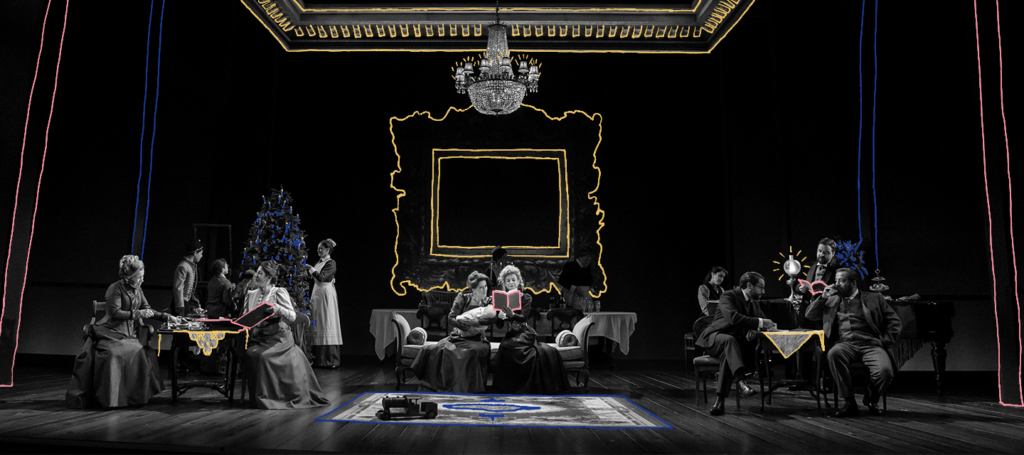


Loss and Remembrance are at the Heart of the Magnificent ‘Leopoldstadt’
Everything in Leopoldstadt unfolds like a game of cat’s cradle.
It’s 1899 and the Merz & Jakobovicz family portrait is one of abundance and contentment. The conversations flow along with whiskey and music, as family members discuss Freud’s latest theories, which Hermann Merz (David Krumholtz) disdains, mathematician Riemann’s still unsolved hypothesis, which Ludwig Jakobovicz (Brandon Uranowitz) adulates, and Klimt’s new painting, which Hermann’s Catholic wife, Gretl (Faye Castelow) is posing for in her green shawl.
This is a Jewish family that takes pride in assimilating into their adopted Austrian identity, having gained a respectable seat in the Viennese high society; a Jewish family where the grandchildren fight over who gets to place the star on top of the Christmas tree (though Hermann’s son Jacob accidentally put the star of David there at first) and where the eldest son, Hermann, who helms the family business, has converted to Christianity and can no longer recall when Passover is.
Yet, behind this apparently cerebral and well-manicured façade, there’s a pang of something inexplicable, something missing, like the result of, say, collective amnesia triggered both by choice and circumstance.
“It’s like a second death, to lose your name in a family album,” Grandma Emilia Merz (Betsy Aidem) says as she points out those faces lost in time to her daughter-in-law Wilma (Jenna Augen), visages immortalised between the pages of a family album, yet complete strangers to their descendants.
A master of ensuring clarity within the most complex of interwoven narratives, Sir Tom Stoppard doesn’t disappoint in Leopoldstadt (titled after a neighbourhood known as the Jewish quarter of Vienna). Having spent most of his life identifying solely as British, the playwright lays bare a personal reckoning of lost identities and familial history in this sprawling tale that traces the experience of four generations of a family, based on his very own, through wars and other forms of violence.
But what exactly makes a people choose to reject, or rather, forget their own identity?
Back to the post-dinner conversations at Christmas, difficult questions are being asked, under a thin veil of the mildly intoxicated merriment of familial banters. “My grandfather wore a caftan, my father went to the opera in a top hat, and I have the singers to dinner,” Hermann paints a picture of hope and progress where his children play crickets and tennis, “We’re the torchbearers of assimilation.”
Except you quickly discover that the Merz family’s status and wealth, as well as their willingness to be “model Austrians,” cannot build them an impenetrable wall from the antisemitic sentiment that’s alive and well in turn-of-the-20th-century Austria. Looking through this family album with knowledge of what was about to take place in Europe, there’s a brewing dread that accompanies the sympathy you feel for this family living in naïve optimism that things are looking up, because “it can’t happen again,” can it? After all, the days of Jewish people wearing yellow patches, being confined within Leopoldstadt, had come to an end.
The play tumbles forward in time, to 1924, when the Merz & Jakobovicz family are now patriots, having lost their children in WWI; to 1938, when the family members are now hostages of the Nazis, having lost everything on Kristallnacht; and eventually, to 1955, when the remaining members of the family reconnect back in Vienna, having been scattered across the world.
Although the Merz & Jakobovicz’s story is a familiar one, a shared tragic experience of countless families of Jewish descent, what makes Leopoldstadt unique comes from not only Stoppard’s special brand of quick wit and literary prowess but also the hard questions the playwright is asking through this multidimensional narrative from a deeply personal place.
Indeed, what is the cost of survival? When you’ve had to erase every trace of what makes you, you, just to carry on living, is there still a way to keep your ancestors alive? Or do they die a second death like those nameless faces in Grandma Emilia’s family album? Or, can it be as simple as playing cat’s cradle?
In a poignant scene set in 1938, Ludwig attempts to explain the hidden mathematical concepts within the child’s game to his grandson Leo (Michael Deaner) and his sister Wilma’s grandson Nathan (Anthony Rosenthal), drawing the boys’ attention to the knots they make in the thread which seem to move without rhyme or reason. “The knots aren’t allowed to show up anywhere they like,” observes Nathan, “They always stay the same distance from each other, because we didn’t cut the string.” To which Ludwig exclaims with pride about young Nathan: “This is a mathematician.”
And yet, just as mathematicians are often poets at heart, the sustained connectivity between knots on a thread seems to signify something far more philosophical than constant numbers – forces of the world had driven the Merz children apart, but no matter where they end up in the world, they will remain connected by the same memories – those are the things cannot be taken away. It’s a simple game, a piece of ordinary thread, but also an article of faith that reminds one of hope.
A transfer from the West End, Leopoldstadt is a production of superb clarity and nuance, with director Patrick Marber at the helm running a smooth and tight ship with a massive ensemble of immense talent, each expertly telling this difficult yet extraordinarily intimate story of confronting one’s own identities and shared generational trauma.
Uranowitz is a standout as both Ludwig and adult Nathan, a pair of characters who are similar yet subtly distinct from each other. Krumholtz’s Hermann, one of the most complex and intriguing characters in the play, is also embodied with commanding presence. I was thoroughly impressed by many of the performers who portray their characters as they age roughly four decades over the course of a 2 hour and 10 minutes play, with impeccable nuance.
The design of the production is simple yet effective, Richard Hudson’s set remains constant yet breathes through time, Neil Austin’s lighting is sleek, and Adam Cork’s sound design punctuates the dramatic beats perfectly.
Stepping off the pavement in NYC in 2022, an epicenter of cultural exchanges just like Vienna in 1899, I look to the future with as much hope as caution as those of us who need to assimilate in a society where antisemitism and racism are still alive and well. I hope we hold onto that shared thread of memories that connect all of us, beyond racial identities, beyond the various levels of privilege and oppression we hold within ourselves because of the colors of our skin, or the shapes of our eyes.
“It can’t happen again,” Leo claims, half delusional, half hopeful. We all think it every time, and we want it, every time, in the calm after the storm. But it can happen again; it’s still happening, all the time; and it can get worse.
And for that, we remember.
Keep Reading

Rushed Storytelling Robs ‘The Kite Runner’ of Its Emotional Impact
A good story is something you enjoy. A great story stays with you and echoes through the ages. Khaled Hosseini’s semi-autobiographical novel The Kite Runner is certainly a great story. Spanning across decades and continents, its labyrinth of interwoven threads tugs at your heartstrings with every twist. Matthew Spangler’s stage adaptation of Hosseini’s eponymous novel […]
Read More
You’ll Want to Lose Yourself in this Magical ‘Into the Woods’
It’s almost impossible to offer a summary of Into the Woods that makes justice to the story, or rather, the nebula of stories that comprise it. “Anything can happen in the woods,” says Cinderella’s Prince to the Baker’s Wife. Indeed, the woods are where worlds collide, an in-between place where nothing is what it seems. […]
Read More












